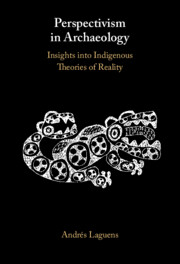Book contents
- Perspectivism in Archaeology
- Perspectivism in Archaeology
- Copyright page
- Dedication
- Contents
- Figures
- Foreword
- Preface
- Acknowledgements
- Abbreviations
- 1 Perspectivism
- 2 Perspectivism as a Theory
- 3 Perspectivism, Materials and Objects
- 4 A Perspectivist Approach to the Archaeology of Ambato
- 5 Pot-Persons in Ambato
- 6 Inhabiting a Perspectivist World
- 7 Perspectivism and Archaeology
- References
- Index
3 - Perspectivism, Materials and Objects
Published online by Cambridge University Press: 01 February 2024
- Perspectivism in Archaeology
- Perspectivism in Archaeology
- Copyright page
- Dedication
- Contents
- Figures
- Foreword
- Preface
- Acknowledgements
- Abbreviations
- 1 Perspectivism
- 2 Perspectivism as a Theory
- 3 Perspectivism, Materials and Objects
- 4 A Perspectivist Approach to the Archaeology of Ambato
- 5 Pot-Persons in Ambato
- 6 Inhabiting a Perspectivist World
- 7 Perspectivism and Archaeology
- References
- Index
Summary
Chapter 3 describes perspectivism’s world of objects and its concept of materiality, including the material implications of its notion of reality and the practices in which the material plays a key role. Assumptions about materiality in archaeology are revised by taking the conception of matter in perspectivism and putting it in dialogue with theories of matter in material culture studies. The critical question of material agency in perspectivism, including the possibility of object agency, is taken up. Objects and materiality, under certain circumstances and in specific relational contexts in perspectivism, affect humans and non-humans through a capacity that belongs to them. Two other agencies concerning objects can be identified: the first, proper to objects as things, is their capacity as intermediaries between humans and non-humans; the second is the agency of things as non-human objects rather than as inert things. Lacking a native concept of materiality proper to a case of study in the southern Andes, perspectivism provides a stand-in; its concept of objects as possessing their qualities, and instances in which they are in active relations with humans and other non-humans, enables the analysis of the ontological status of objects in the past.
- Type
- Chapter
- Information
- Perspectivism in ArchaeologyInsights into Indigenous Theories of Reality, pp. 62 - 86Publisher: Cambridge University PressPrint publication year: 2024

